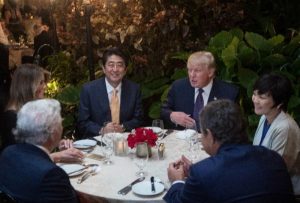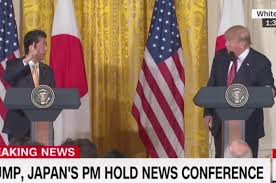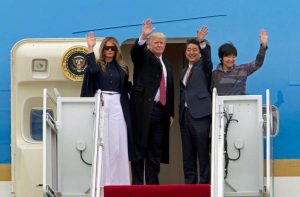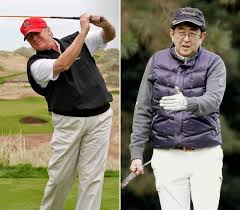
Talks at the White House, dinner at a private club and a round of golf — US President Donald Trump and Japanese Prime Minister Shinzo Abe showed how serious diplomacy and weekend fun could blend to strike a personal chemistry between them and herald a new chapter in ties between the world’s sole super power and its major ally in Asia.
Appearing at a joint media conference with Mr Abe after the talks, Mr Trump underlined the US’ commitment to defend Japan in the face of China’s massive maritime build-up and North Korea nuclear missile programme. This categorical assistance appears to have put behind Mr Trump’s strident election campaign rhetoric last year that suggested Tokyo pay more for enjoying the American security umbrella.
 “We are committed to the security of Japan and all areas under its administrative control and to further strengthening our very crucial alliance,” the US president said. “The bond between our two nations and the friendship between our two peoples runs very, very deep. This administration is committed to bringing those ties even closer,” he added.
“We are committed to the security of Japan and all areas under its administrative control and to further strengthening our very crucial alliance,” the US president said. “The bond between our two nations and the friendship between our two peoples runs very, very deep. This administration is committed to bringing those ties even closer,” he added.
A joint US-Japan statement said the U.S. commitment to defend Japan through nuclear and conventional military capabilities is unwavering.
Mr Abe, who was the first foreign leader to meet Mr Trump after the latter’s election victory in November last year, went to Washington this time, seeking to develop trust with the new US president and send a message that the long-standing alliance remains intact. That sense of trust from Mr Trump was essential for Mr Abe after the US president’s remarks during his campaign, warning to Toyota on Twitter that he would slap a “big border tax” on the carmaker if it built a new plant in Mexico and his contention that Japan devalues its currency to gain advantage in export.
Mr Abe’s Washington mission proved to be successful as he got Mr Trump’s assurance in clear terms that the US would continue to back Japan in its dispute with China over territorial claims in some islands in the East China Sea that China also claims. The joint statement said the two leaders affirmed that Article 5 of the US-Japan security treaty covered the islands, known as the Senkaku in Japan and the Diaoyu in China, as is evident from Mr Trump’s reference to the areas under Japan’s administrative control.
Mr Trump’s remarks must have been music for Mr Abe after doubts had arisen in Tokyo about the Trump administration’s commitment to a mutual defence treaty with Japan. The Trump-Abe meeting was closely scanned in Beijing, which sees the US-Japan alliance as posing a formidable obstacle to its regional ambitions in the Asia-Pacific region.
Economic Diplomacy
 Besides geopolitics, economic diplomacy dominated Mr Abe’s agenda in Washington. Conscious of the US president’s insistence on “America First” and his apprehensions about the loss of American jobs as foreign companies look for cheaper foreign labour, Mr Abe underscored that “Japanese businesses have built factories all over the United States” and invested $150 billion, creating many American jobs. “Japan, with our high level of technical capability, we will be able to contribute to President Trump’s growth strategy,” he said, adding “there will be even more new jobs being born in the United States.”
Besides geopolitics, economic diplomacy dominated Mr Abe’s agenda in Washington. Conscious of the US president’s insistence on “America First” and his apprehensions about the loss of American jobs as foreign companies look for cheaper foreign labour, Mr Abe underscored that “Japanese businesses have built factories all over the United States” and invested $150 billion, creating many American jobs. “Japan, with our high level of technical capability, we will be able to contribute to President Trump’s growth strategy,” he said, adding “there will be even more new jobs being born in the United States.”
 Mr Abe didn’t miss this opportunity to tout Japan’s famed bullet-train technology, saying if the facility had existed along America’s Eastern corridor, it would take “only one hour” for the president to travel from the White House in Washington to Trump Tower in New York.
Mr Abe didn’t miss this opportunity to tout Japan’s famed bullet-train technology, saying if the facility had existed along America’s Eastern corridor, it would take “only one hour” for the president to travel from the White House in Washington to Trump Tower in New York.
The remarkable bonhomie between Mr Trump and Mr Abe was clearly signalled by the US president. “We have a very, very good bond — very, very good chemistry,” said Mr Trump.
(Pallab Bhattachrya contributed inputs for this article)
Author Profile
- India Writes Network (www.indiawrites.org) is an emerging think tank and a media-publishing company focused on international affairs & the India Story. Centre for Global India Insights is the research arm of India Writes Network. To subscribe to India and the World, write to editor@indiawrites.org. A venture of TGII Media Private Limited, a leading media, publishing and consultancy company, IWN has carved a niche for balanced and exhaustive reporting and analysis of international affairs. Eminent personalities, politicians, diplomats, authors, strategy gurus and news-makers have contributed to India Writes Network, as also “India and the World,” a magazine focused on global affairs.
Latest entries
 DiplomacyJanuary 5, 2026India walks diplomatic tightrope over US operation in Venezuela
DiplomacyJanuary 5, 2026India walks diplomatic tightrope over US operation in Venezuela India and the WorldNovember 26, 2025G20@20: Africa’s Moment – The Once and Future World Order
India and the WorldNovember 26, 2025G20@20: Africa’s Moment – The Once and Future World Order DiplomacyOctober 4, 2025UNGA Resolution 2758 Must Not Be Distorted, One-China Principle Brooks No Challenge
DiplomacyOctober 4, 2025UNGA Resolution 2758 Must Not Be Distorted, One-China Principle Brooks No Challenge India and the WorldJuly 26, 2025MPs, diplomats laud Operation Sindoor, call for national unity to combat Pakistan-sponsored terror
India and the WorldJuly 26, 2025MPs, diplomats laud Operation Sindoor, call for national unity to combat Pakistan-sponsored terror







